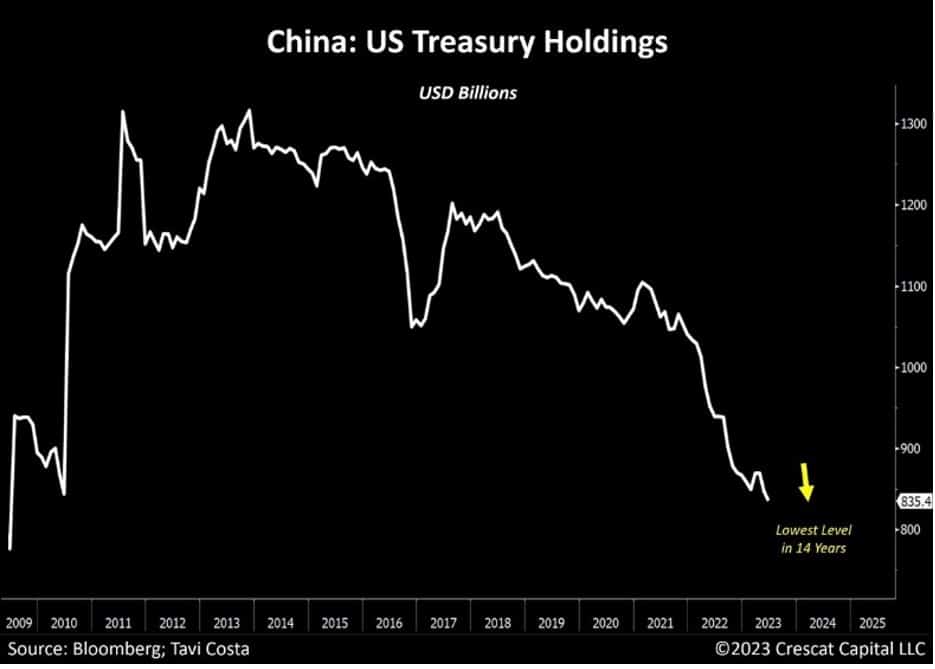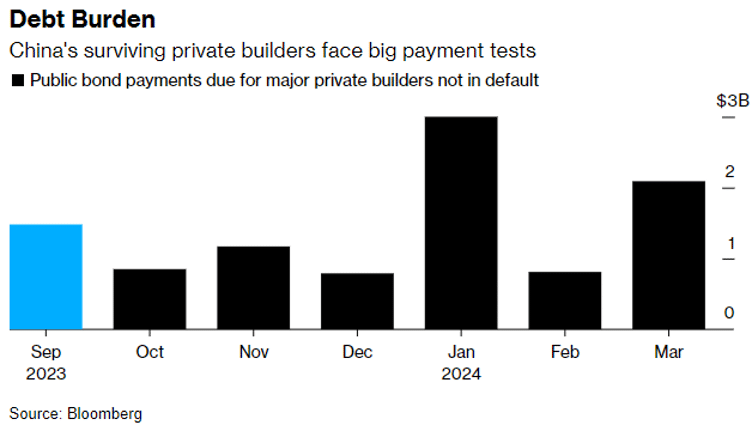Increasing Sino-US tensions, emergency fiscal measures, and a collapsing real estate sector all signpost a near-term serious economic shock.
While economists have been warning that China faces imminent economic collapse since the start of the economic miracle, the warning signs coming out of the Communist country’s heavily massaged figures are blaring red.
Of course, this may yet be another blip along the growth journey — but the pandemic hangover being experienced by the country seems far larger than previously thought. Perhaps you can’t lock down citizens for month son end without causing some financial repercussions.
Chinese credit event?
Let’s start with the experts. Bloomberg Economics is now forecasting that it will take until the mid-2040s for China’s GDP to exceed current global leader the US, and even then this may only happen by ‘only a small margin’ before ‘falling back behind.’ For context, prior to the pandemic, they expected China to eclipse the US by 2030.
The analysts note that ‘the post-Covid rebound has run out of steam, reflecting a deepening property slump and fading confidence in Beijing’s management of the economy. Weak confidence risks becoming entrenched — resulting in an enduring drag on growth potential.’ They now expect growth to slow to 3.5% in 2030 and fall to 1% by 2050 — and the country only grew by 3% last year.
Long-term structural problems are becoming more apparent as the mask of economic power slips. It reported its first population drop in 2022 since the 1960s — a legacy of the one-child policy, and has hit tech platforms such as Ant Group with regulatory kicking.
Further, there’s the growing Sino-US geopolitical tensions. While goods trade between the two countries hit a record hit a record $690.6 billion, and the US trade deficit with China expanded by 8.3% to $382.9 billion in 2022, there are growing problems:
- regulatory spats over US-listed Chinese tech stocks
- ongoing arguments over the origin of covid-19
- the economic power of the BRICS nations, perhaps planning a new global reserve currency underpinned by commodities including gold
- the prospect of a TikTok ban with bipartisan US political support that it constitutes a Chinese state weapon
- tensions over Chinese ambivalence of Russia’s invasion of Ukraine
- Chinese spy balloons
- the US ban on exports of chipmaking products and advanced semiconductors to China
- the Chinese ban ion exports of certain critical minerals
- Chinese ban on iPhones for government officials/Huawei ban in US
- tit-for-tat import/export bans
For context, China’s US Treasury holdings now stand at $835 billion, a 14 year low.

While Bloomberg’s economists say that the medium-term remains optimistic due to the ‘enormous size of the economy, significant space to catch up to global technology leaders and the development focus of the government,’ they do warn that China is acting with ‘diminished force.’
Immediate credit concerns
Over the past few weeks, China has been imposing multiple emergency fiscal responses to the deteriorating macroeconomic climate and rocketing youth unemployment. For context, China’s services purchase managers’ index (PMI) was better than expected, and yet still did little to help the country’s stock markets.
Measures include:
- approved 37 retail funds
- relaxed guidance on residential housing loans
- cut deposit interest rates
- considering a ban on short-selling stocks
- lowered deposit requirements for first and second-time buyers
- slowed the pace of approved IPOs
- pressure on lenders to reduce mortgage rates
- plans to make it easier to buy large numbers of unsold homes in Chinese cities
- directed funds to avoid net equity sales
- asked exchanges to lower margin requirements
Most interestingly, China has just extended tax breaks on electric vehicles to 2027, despite EV retail sales between January and August rising by 36% year-over-year — with 20% of EV sales in Europe imported from the country. If the industry, or rate of growth were self-sustaining, this would not need to happen.
Property fears
Ever since the start of the Evergrande crisis around mid-2021, investors have been waiting for a Chinese real estate liquidity crunch. The property developer finally filed Chapter 15 bankruptcy a few weeks ago, and sought protection from creditors in the US, but it could be the first of many.
Developer Country Garden seemed on the verge of collapse, but creditors (likely under intense political pressure) have agreed to restructure its overdue debts to prevent another high profile default.
At present, 34 of the 50 largest private real estate developers in China are suffering delinquencies. And the other 16 developers are close to this — facing a combined $1.5 billion in bond payments in August alone — and $3 billion in January 2024.

All the while, the Chinese HY Real Estate Index has fallen by over 80% over the past two years — a far larger fall than international comparators. Meanwhile, China’s largest bank, Industrial & Commercial Bank of China, has fallen to its lowest market cap ever.
China has now cut interest rates on close to $6 trillion of mortgages. The last time took this emergency step was during the 2008 Global Financial Crisis. And the country’s sole political party can use its power to stem immediate further losses — but is powerless against the laws of mathematics.
Real estate — and associated sectors — is worth between 30-40% of China’s annual GDP.
It’s not looking good.
This article has been prepared for information purposes only by Charles Archer. It does not constitute advice, and no party accepts any liability for either accuracy or for investing decisions made using the information provided.
Further, it is not intended for distribution to, or use by, any person in any country or jurisdiction where such distribution or use would be contrary to local law or regulation.
Great article Charles – thanks.
I note that China is not handling EV subsidies too well… https://youtu.be/xopvIr5JVNw?si=uos_gKkSeTDqaOUR
Hi Justin,
Much like the underreported 30% youth unemployment, China has spent billions on subsidies — but if demand isn’t there, it doesn’t matter. Turns out you can’t lock down an industrial export-based economy for two years without financial repercussions😊